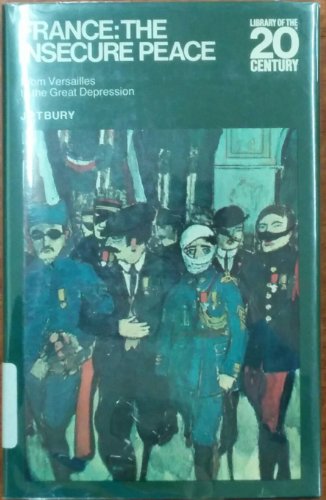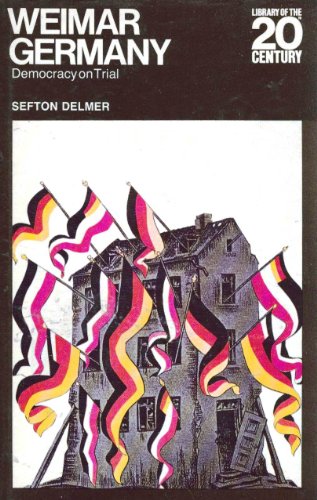macdonald american heritage press (7 results)
Product Type
- All Product Types
- Books (7)
- Magazines & Periodicals
- Comics
- Sheet Music
- Art, Prints & Posters
- Photographs
- Maps
-
Manuscripts &
Paper Collectibles
Condition
- All Conditions
- New
- Used
Binding
Collectible Attributes
- First Edition (3)
- Signed
- Dust Jacket (3)
- Seller-Supplied Images
- Not Printed On Demand
Seller Location
Seller Rating
-
France: Partial Eclipse: From the Stavisky Riots to the Nazi Conquest
Published by Library of the 20th Century Macdonald/American Heritage Press January 1974, 1974
ISBN 10: 0070350841ISBN 13: 9780070350847
Seller: Book People, Henrico, VA, U.S.A.
Book
Trade Paperback. Condition: Very Good. Condition of the book is Very Good. A little shelf worn but looks unread.
-
France: Partial Eclipse: From the Stavisky Riots to the Nazi Conquest
Published by Macdonald/American Heritage Press, 1974
ISBN 10: 0070350841ISBN 13: 9780070350847
Book
Soft cover. Condition: Very Good.
-
FRANCE: PARTIAL ECLIPSE
Published by Macdonald/ American Heritage Press, New York, 1972
Seller: Trouve Books, Cincinnati, OH, U.S.A.
Book First Edition
Hardcover. Condition: Near Fine. Dust Jacket Condition: Very Good+. 1st American Edition. Book is clean and tight, interior is pristine. Jacket has edge creasing and wear on top edges. The French political climate just before World War 2.
-
France: Partial Eclipse: From the Stavisky Riots to the Nazi Conquest
Published by Library of the 20th Century Macdonald/American Heritage Press, 1974
ISBN 10: 0070350841ISBN 13: 9780070350847
Seller: Basement Seller 101, Cincinnati, OH, U.S.A.
Book
Paperback. Condition: As New.
-
France: Partial Eclipse: From the Stavisky Riots to the Nazi Conquest
Published by Library of the 20th Century Macdonald/American Heritage Press, 1974
ISBN 10: 0070350841ISBN 13: 9780070350847
Seller: Irish Booksellers, Portland, ME, U.S.A.
Book
Condition: Good. SHIPS FROM USA. Used books have different signs of use and do not include supplemental materials such as CDs, Dvds, Access Codes, charts or any other extra material. All used books might have various degrees of writing, highliting and wear and tear and possibly be an ex-library with the usual stickers and stamps. Dust Jackets are not guaranteed and when still present, they will have various degrees of tear and damage. All images are Stock Photos, not of the actual item. book.
-
France: The Insecure Peace; From Versailles to the Great Depression
Published by American Heritage Press, Macdonald, New York, London, 1972
ISBN 10: 0070092680ISBN 13: 9780070092686
Seller: Ground Zero Books, Ltd., Silver Spring, MD, U.S.A.
Book First Edition
Hardcover. Condition: Very good. Dust Jacket Condition: Very good. Presumed First Edition, First printing. 151, [1] pages. Illustrations (some in color). Chronology of Events. Index of main people, places, and events. Author's suggestions for further reading. This is one of the Library of the 20th Century. John Patrick Tuer Bury was very much a Cambridge man. Nephew of a Regius Professor of Modern History, and the son of a Cambridge LittD, he himself held a Fellowship at Corpus Christi College for over fifty-four years (1933-87), and, following appointment as Lecturer in History in 1937, remained a loyal and hard-working member of the History Faculty until his retirement in 1975. This service, both to college and university, was interrupted only by spells with the Ministry of Supply and with the Foreign Office during World War II. A leading authority on the French Third Republic, he published, over nearly fifty years, three classic studies of Le on Gambetta, which in conjunction with his other studies of French history, and of Anglo-French relations, earned him the respect and affection of historians in both countries. Bury was also heavily involved in the compilation of that massive cooperative post-war labor, the Documents on British Foreign Policy, 1919-39. He edited volume ten of the New Cambridge Modern History (1960). Interwar France covers the political, economic, diplomatic, cultural and social history of France from 1919 to 1939. France suffered heavily during World War I in terms of lives lost, disabled veterans and ruined agricultural and industrial areas occupied by Germany as well as heavy borrowing from the United States, Britain, and the French people. However, postwar reconstruction was rapid, and the long history of political warfare along religious lines was finally ended. Parisian culture was world-famous in the 1920s, with expatriate artists, musicians and writers from across the globe contributing their cosmopolitanism, such as jazz music, and the French empire was in flourishing condition, especially in North Africa, and in Subsaharan Africa. Although the official goal was complete assimilation, few colonial subjects were actually assimilated. Major concerns were forcing Germany to pay for the war damage by reparations payments and guaranteeing that Germany, with its much larger population, would never be a military threat in the future. Efforts to set up military alliances worked poorly. Relations remained very tense with Germany until 1924, when they stabilized thanks to large American bank loans. However, after 1929 the German economy was very badly hit by the Great Depression, and its political scene descended into chaos and violence. The Nazis under Hitler took control in early 1933 and aggressively rearmed. Paris was bitterly divided between pacifism and rearmament, so it supported London's efforts to appease Hitler. French domestic politics became increasingly chaotic and grim after 1932, moving back and forth between right and left, without clear goals in mind. The economy finally succumbed to the Great Depression by 1932 and did not recover. The popular mood turned very sour and focused its wrath on the corruption and scandals in high government places. There was a growing threat of politicized right-wing violence in the streets of Paris, but the numerous right-wing groupings were unable to forge a political coalition. On the left, the Popular Front pulled together Radicals (a centrist group), socialists and communists. The coalition stayed in power for 13 months from 1936 to 1937. After massive labor union strikes, it passed a series of reforms designed to help the working classes. The reforms were mostly failures, and the disheartened Popular Front collapsed on foreign policy issues. War came when Hitler's Germany stunningly reached a détente with Stalin's Soviet Union in August 1939, and both countries invaded Poland In September 1939. France and Britain had pledged to defend Poland and so declared war on Germany.
-
Weimar Germany; Democracy on Trial
Published by American Heritage Press, Macdonald, New York, London, 1972
ISBN 10: 0070162611ISBN 13: 9780070162617
Seller: Ground Zero Books, Ltd., Silver Spring, MD, U.S.A.
Book First Edition
Hardcover. Condition: Very good. Dust Jacket Condition: Good. Presumed First Edition, First printing. 127, [1] pages. DJ has slight wear and soiling. Illustrations (some in color). Maps. Chronology of Events. Index of main people, places, and events. Author's suggestions for further reading. This is one of the Library of the 20th Century. Denis Sefton Delmer (24 May 1904, Berlin - 4 September 1979, Lamarsh) was a British journalist of Australian heritage and propagandist for the British government during the Second World War. Fluent in German, he became friendly with Ernst Röhm, who arranged for him to interview Adolf Hitler in 1931. During the war, he led a black propaganda campaign against Hitler by radio from England. It was so successful that Delmer was named in the Nazis' Black Book for immediate arrest after their planned invasion of Britain. In the 1932 German federal election, Delmer traveled with Hitler aboard his private aircraft. He was "embedded with Nazi party activists" at this time. He was also present in 1933 when Hitler inspected the aftermath of the Reichstag fire. The Nazi leaders were convinced Delmer was a member of MI6; his denials of any involvement only served to strengthen their belief that he was not only a member, but an important one. In 1933, Delmer was sent to France as head of the Daily Express Paris Bureau. In 1936, Delmer married the artist Isabel Nichols. Delmer covered important events in Europe including the Spanish Civil War and the invasion of Poland by the Wehrmacht in 1939. He also reported on the German western offensive in 1940. The Weimar Republic officially named the German Reich, was the government of Germany from 1918 to 1933, during which it was a constitutional federal republic for the first time in history; hence it is also referred to, and unofficially proclaimed itself, as the German Republic (Deutsche Republik). The state's informal name is derived from the city of Weimar, which hosted the constituent assembly that established its government. In English, the state was usually simply called "Germany", with "Weimar Republic" not commonly used until the 1930s. Following the devastation of the First World War (1914-1918), Germany was exhausted and sued for peace in desperate circumstances. Awareness of imminent defeat sparked a revolution, the abdication of Kaiser Wilhelm II, formal surrender to the Allies, and the proclamation of the Weimar Republic on 9 November 1918. In its initial years, grave problems beset the Republic, such as hyperinflation and political extremism, including political murders and two attempted seizures of power by contending paramilitaries; internationally, it suffered isolation, reduced diplomatic standing, and contentious relationships with the great powers. By 1924, a great deal of monetary and political stability was restored, and the republic enjoyed relative prosperity for the next five years. Under the Locarno Treaties of 1925, Germany moved toward normalizing relations with its neighbors, recognizing most territorial changes under the Treaty of Versailles and committing to never go to war. The following year, it joined the League of Nations, which marked its reintegration into the international community. Nevertheless, especially on the political right, there remained strong and widespread resentment against the treaty and those who had signed and supported it. The Great Depression of October 1929 severely impacted Germany's tenuous progress; high unemployment and subsequent social and political unrest led to the collapse of the coalition government. From March 1930 onwards, President Paul von Hindenburg used emergency powers to back Chancellors Heinrich Brüning, Franz von Papen and General Kurt von Schleicher. On 30 January 1933, Hindenburg appointed Adolf Hitler as Chancellor to head a coalition government; Hitler's far-right Nazi Party held two out of ten cabinet seats. Von Papen, as Vice-Chancellor and Hindenburg's confidant, was to serve as the éminence grise who would keep Hitler under control; these intentions badly underestimated Hitler's political abilities. By the end of March 1933, the Reichstag Fire Decree and the Enabling Act of 1933 had used the perceived state of emergency to effectively grant the new Chancellor broad power to act outside parliamentary control. Hitler promptly used these powers to thwart constitutional governance and suspend civil liberties, which brought about the swift collapse of democracy at the federal and state level, and the creation of a one-party dictatorship under his leadership.





